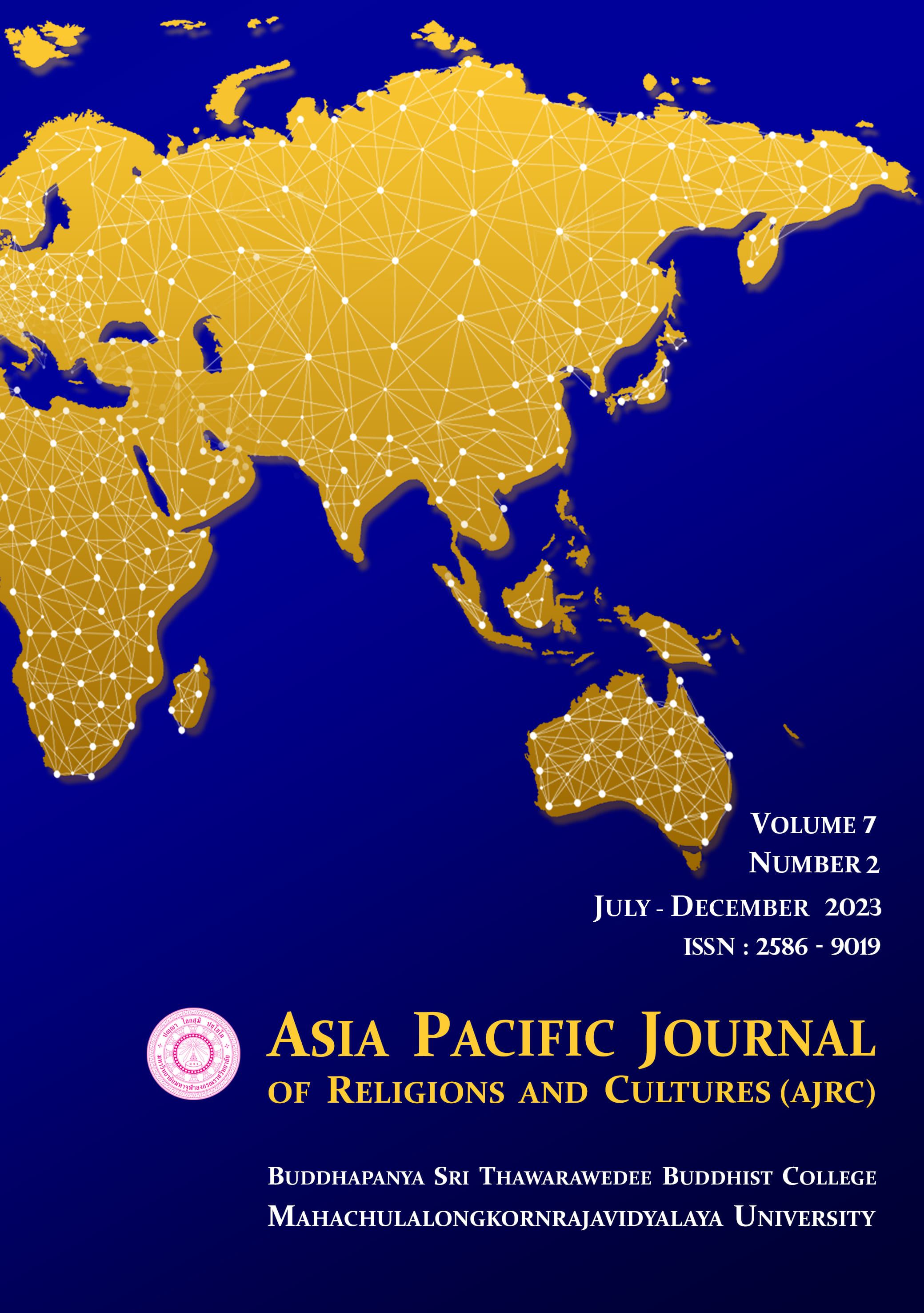INFLUENCING FACTORS OF MENTAL HEALTH MANAGEMENT IN MEDICAL SCHOOLS IN CHINA
Main Article Content
Abstract
The research topic “Influencing Factors of Mental Health Management in Medical Schools in China” this research proposed to 1) study the types of mental health of medical students in Shaanxi province, 2) investigate the significant factors causing mental illness in medical students in Shaanxi province, 3) conduct a structural equation model of mental healthcare management for medical students in Shaanxi province, and 4) assess the model implementation for helping in the mental health management of medical students in Shaanxi province. The study was quantitative and qualitative research and used questionnaires and interview forms for collecting data. The questionnaires were launched to 488 medical students from three medical universities in Shaanxi province in China. The qualitative data was collected with an in-depth interview of 12 teachers and 24 medical students from the sample universities as well. Teachers were the ones who were concerned with students’ psychological treatments in three medical universities in the research.
The results revealed that most respondents were females, 65.37%, at the age of 22 – 23 years old, 48.77%, studied in the 2nd year of medical universities, 34.63%, in more-than-one-child families, 69.88%, and parents stay together, 72.54%, having an average income of the family of 3,001-5,000 Yuan, having the latest GPA at 2.6 – 3.0, 38.11%, and students didn’t have the congenital disease, 97.75. The results of skewness and kurtosis tests for normal distribution and the relationship between variables used for analysis are suitable for the structural equation model analysis. The structural equation model of mental health management for medical students as MF =0.342*ScF +0.511*SoF +0.567*PF + 0.369*FF; R2 = 0.812 It shows that school factors, social factors, personal factors, and family factors have positive relations with mindfulness factors. If the school, social, personal, and family conditions are good, the mental health of medical students will be good as well. The hypothesis results are accepted. New knowledge of this study seems familiar with other research knowledge, but it’s not verisimilitude in detail. Therefore, the new knowledge of this study can be applied to make the guidelines for mental health management at medical universities in China.
Article Details

This work is licensed under a Creative Commons Attribution-NonCommercial-NoDerivatives 4.0 International License.
References
Allen, S.F., Stevenson, J., Lazuras, L. and Akram, U. (2021). The role of the COVID-19 pandemic in altered psychological well-being, mental health and sleep: an online cross-sectional study. Psychology, Health & Medicine, DOI:10.1080/13548506.2021.1916963
Anand, S. et al. (2008). Health System Reform in China 5, China’s Human Resources for Health: Quantity, Quality, and Distribution. The Lancet 2008: 372: 1774-1781.
Auerbach, R.P. et al. (2018).WHO World Mental Health Surveys International College Student Project: Prevalence and Distribution of Mental Disorders. Journal Abnormal Psychology: 127, 623-638.
Cui, J. et al. (2022). COVID-19 Impact on Mental Health. BMC Medical Research Methodology 22: 15.
Dagbag, J., Culzon, H.G., and Bete, A. (2019). College Students' Problems and Their Link to Academic Performance: Basis for Needs-driven Student Programs. Journal of Research, Policy & Practice of Teachers & Teacher Education 9(2), 54-56.
Diamantopoulos, A., & Siguaw, J. A. (2000). Introduction to LISREL: A guide for the uninitiated. London: Sage.
Firat, M. et al. (2021). Investigating the Factors Affecting Depression by Using Structural Equation Modeling. Galician Medical Journal 28(1) E202111.
Hair, J.F. et al. (2010). Multivariate Data Analysis. 6th ed. Upper Saddle River.
NJ: Pearson Education International.
Hoogland, J. J., & Boomsma, A. (1998). Robustness studies in covariance structure modeling-An overview and a meta-analysis. Sociological Methods and Research, 26 (3).
Kessler R.C. et al. (2005). Lifetime Prevalence and Age of Onset Distributions of DSM-IV Disorders in the National Comorbidity Survey Replication. Psychiatry, 62, 593-602.
National Healthcare Security Administration. (2022). National Healthcare Policy. Retrieved from www.nhsa.gov.cn/art/2021/9/30/.html.
Parekh, R. (2018). What is Mental Illness? American Psychiatric Association. Retrieved from https://www.psychiatry.org/patients-families/what-is-mental-illness.
Rotenstein, L.S. (2016). Prevalence of Depression, Depressive Symptoms, and Suicidal Ideation Among Medical Students: A Systematic Review and Meta-Analysis. JAMA: 316, 2214-2236 The State Council. (2016). Central People’s Government of PRC: Outline of the “Healthy China 2030”, plan issue by Central Committee of the Communist Party of China. Retrieved from http://www.gov.cn/zhengce/2016-10/25/ content_5124174.htm.
Saris, W. E. & Strenkhorst, L. H. (1984). “Causal modeling non experimental research: An Introduction to the Lisrel approach” Dissertation Abstract International, 47(7).
Scherer, S., Talley, C.P., and Fife, J. (2017). How Personal Factors Influence Academic Behavior and GPA in African American STEM Students. SAGE Open 2017: 1-14.
Sirin, Y.E. and Sahin, M. (2020). Investigating of Factors Affecting the Achievement of University students with Logistic Regression Analysis: School of Physical Education and Sport Example. SAGE Open 2020: 1-9.
Taylor, S. (2019). The Psychology of Pandemics: Preparing of the Next Global Outbreak of Infections Disease. Cambridge Scholar Publishing.
The China Perspective. (2016). Shaanxi Province.Retrived from https://web.archive.org/web/20111008045729/http://thechinaperspective.com/topics/province/shaanxi-province/
Trinh, LTT., et al. (2020). Factors Affecting Academic Performance of First-Year University Students: A Case of a Vietnamese University. International Journal of Education and Practice 8(2), 221-232.
Vakihiheris, S. and Moheb, N. (2020). The Structural Model of Obsessive-Compulsive Disorder Based on Malaaptive Perfectionism and Parental Psychological Control. Journal of Psychology, 2020, 24 (Summer) 231-247.
Zada, M. et al. (2021). Effect of Mental Health Problems on Academic Performance among University Students in Pakistan. Tech Science Press: International Journal of Medical Health Promotion 2021: 23(3).


